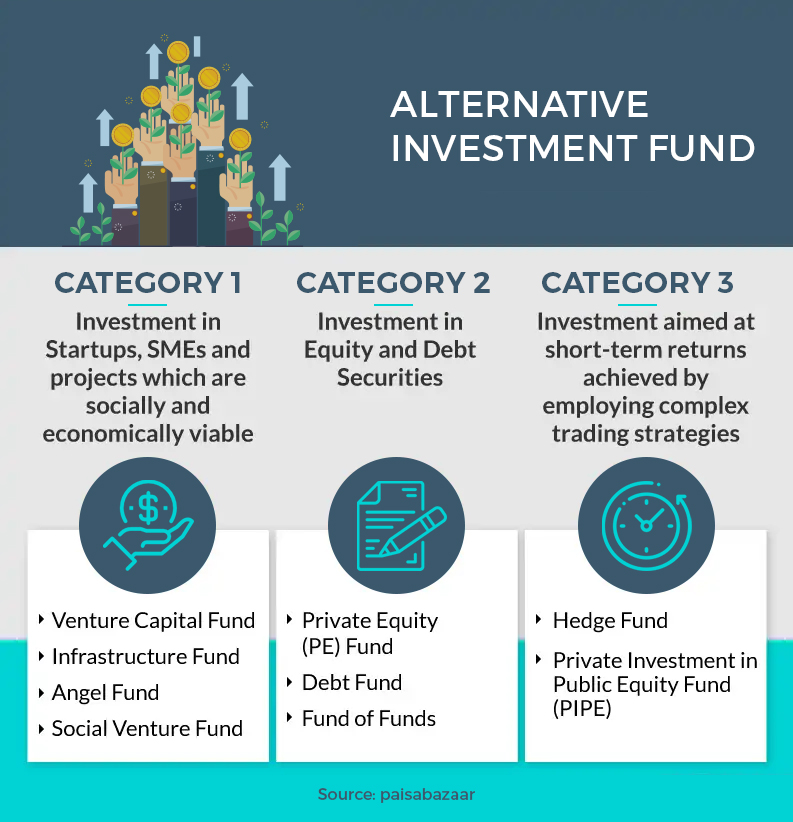Understanding Alternative Investment Funds(AIF)
Alternative Investment Funds (AIFs) are a category of pooled investment vehicles that invest in assets beyond traditional investments like stocks, bonds, and cash. AIFs provide investors access to a diverse range of investment strategies and asset classes, including real estate, private equity, hedge funds, and infrastructure projects.
AIFs fall under the regulation of the Securities and Exchange Board of India (SEBI) through the SEBI (Alternative Investment Funds) Regulations, 2012.
Types of AIFs in India
SEBI has classified Alternative Investment Funds into three categories:

Real Estate Investment through Alternative Investment Funds
Real estate-based AIFs are classified under Category II.
- These AIFs are restricted from directly investing in real estate projects. Instead, they are only permitted to invest in securities issued by real estate project developer companies.
- Real estate-based AIF is limited to investing a maximum of 25% of its investible funds in a single company.
- These are considered relatively less risky compared to other types, largely due to their extended lock-in period, which reduces volatility.
- AIFs specializing in real estate typically invest across various segments of the property market, including residential, commercial, industrial, and hospitality properties.
One of India’s largest real estate AIFs has a corpus of Rs. 2,000 crore and a tenure of 7 years. It invests in residential and commercial real estate projects across India.
Another AIF focuses on structured debt and equity instruments of real estate developers, specifically targeting mid-income and affordable housing projects in the top six cities of India. It boasts a corpus of Rs. 1,500 crore and a tenure of 5 years.
Benefits of Investing in Real Estate through Alternative Investment Funds
-
- Diversification: AIFs pool capital from multiple investors to invest in a diversified portfolio of real estate assets, reducing individual investors’ exposure to specific properties or market segments.
-
- Professional Management: AIFs are managed by experienced fund managers who possess in-depth knowledge of the real estate market. They conduct thorough due diligence, identify lucrative investment opportunities, and actively manage the portfolio to optimize returns.
-
- Regulatory Oversight: AIFs are regulated by the Securities and Exchange Board of India (SEBI) in India, ensuring transparency, compliance, and fair treatment of investors providing investors with a layer of regulatory oversight and investor protection.
-
- Access to Institutional-grade Assets: Investing in real estate through AIFs allows individual investors to access institutional-grade assets that may otherwise be out of reach. These assets often offer higher potential returns and lower risk compared to individual properties.
-
- Risk Mitigation: AIFs employ various risk mitigation strategies, such as diversification, hedging, and active management, to minimize downside risk and preserve capital.
Factors to consider before investing in real estate through an Alternative Investment Funds
Elevated fees: These funds often impose significant management fees, performance fees, and other administrative expenses, which can diminish your overall returns. It’s imperative to meticulously examine the fee structure before committing to an investment.
Leverage risk: Certain funds employ leverage (borrowed capital) to enhance potential returns, but this also magnifies potential losses. Understanding the fund’s leverage strategy and its potential impact on your investment is essential.
Complexity: Grasping the nuances of real estate investment, fund structures, and legal documentation can pose challenges for individual investors. Seeking professional guidance is crucial.
Conclusion
Real estate investment through Alternative Investment Funds (AIFs) offers investors a compelling opportunity to capitalize on the potential of the real estate market. Investors can unlock the potential for attractive returns and long-term wealth creation. As with any investment, it’s essential for investors to conduct thorough due diligence, assess their risk tolerance, and align their investment objectives with the investment strategy of the AIF. With careful planning and prudent decision-making, real estate investment through AIFs can be a valuable addition to an investor’s portfolio.
Stay ahead of the curve with our Real Estate Business Management Program and MahaRERA Agent Training Program ensuring you’re well-equipped to thrive in the dynamic and regulated real estate environment.

